Artificial intelligence is continuing to make an impact on the business world. In fact, McKinsey predicts that up to $2.6 trillion in value will be unlocked by AI in marketing and sales alone.

But, if you’re less tech-savvy, you might be intimidated by terms like “artificial intelligence,” “machine learning,” and “algorithms.” You probably also hear about these technologies and think to yourself, “My business definitely can’t afford that.”
This makes sense. As a good marketer, you should be skeptical about high-priced tech. After all, sometimes it’s hard to tell how a tool works and if it’s actually worth your money. Additionally, if you’re less familiar with AI, it might seem like it’s only necessary for industry-leading behemoths.
There are so many misconceptions about AI in marketing that my colleagues and I launched the Marketing AI Institute. At the organization, we aim to make AI approachable and actionable for marketers. To date, we’ve vetted dozens of AI solutions and have monitored more than 1,500 sales and marketing AI companies with combined funding north of $6.2 billion.
As the Institute’s director, I’ve advised small and medium-sized companies on AI implementations. We’ve also piloted several AI tools in our own marketing operations at the Marketing AI Institute – often for no or extremely low cost.
While you might think that AI is totally out of your budget, there’s actually a chance your business is already using a software or app that relies on this technology to do its job.
Let’s get into the three-step process for implementing AI on a budget, as well as examples of affordable tools that can help you.
Table of Contents
How to Implement AI on a Budget [3 Steps]
Affordable Marketing Automation Software
Familiarizing Yourself With AI
How to Implement AI on a Budget [3 Steps]
1. Determine where AI tools could help you eliminate costs.
At some point, you’ll need to spend money to implement AI. But, how you structure an AI pilot project can help you defray some of the costs.
Although AI, when done right, can increase revenue and reduce costs, you’ll still want to start with a cost-reduction pilot before a revenue-increasing experiment.
A cost-reduction pilot aims to improve (or streamline) processes you already have in place. A revenue-generating pilot, on the other hand, might require new processes — which could ultimately cost more time and money.
In order to kickstart your cost-reduction pilot, you need to first identify time-intensive or repetitive tasks that hold you — or your team — back from high-quality projects in your organization.
.png?width=900&name=AI%20Tools%20(1).png)
Start by making a list of your recurring responsibilities. Track everything you do every week or month, and list the amount of time you spend on each activity. Chances are, there are a ton of tasks that take way too much time each month. It’s likely they’re also pretty data-driven, too.
Next, explore vendors who have created more intelligent ways to do the tasks that are blocking your team.
For example, you might discover that tagging images on your website takes up too much time. AI software can probably free you up from doing that task. Or, you might spend hours each week managing paid advertising. AI can also help there, too.
In fact, there are dozens of ways you can apply AI to immediately free up team time and resources. And, depending on the cost reductions, these pilots may pay for themselves.
2. Research tools that work out of the box.
A handful of small to medium-sized businesses might worry about blowing their budgets when they hear the words, “artificial intelligence” because — at the moment — many AI solutions are built for corporate enterprise.
The truth is, many AI tools need access to quality data at scale to produce results. Enterprises are often the only source of this data. But this doesn’t mean you need to count out AI as a marketer for a smaller business.
In fact, a number of AI tools are affordable, work out of the box, and cut time on basic marketing tasks.
Additionally, you might not know it, but you might already be using popular office tools that are powered by AI.
3. Ask these questions before investing in an AI product.
There are some vendors out there that claim to be AI but aren’t. If you don’t understand what to look for, you could waste time and money on lackluster solutions.
That’s why we encourage every marketer to establish a baseline knowledge of AI. (Our beginner’s guide will cut down your learning curve.)
Aside from familiarizing yourself with the technology, you also need to ask smart questions of AI vendors about the tools they sell.
Start with questions like:
- How does ____ use AI today?
- What AI capabilities are on the product roadmap?
- What type of data do I need for the solution to work?
- Is there any type of minimum size dataset I need to use the solution? (i.e. a certain number of emails sent, visitors to the site, etc.)
- What kinds of in-house capabilities do I need to use and maintain the solution?: Can anyone use it? Do I need dedicated data scientists, machine learning experts?
- My top use cases for AI are A, B, C, etc. Can ___ help?
Curiosity may have killed the cat. But it also saves marketers tons of money when buying new technology. So, don’t be afraid to ask questions and do deep research on each product you’re considering before you invest.
Affordable Marketing Automation Software
Here are a few examples of popular and affordable AI-powered tools:
1. Grammarly
Price: Free; Premium plans to start at $11.66/mo for an annual commitment.
Grammarly is an intuitive copy-editing tool that uses machine learning to recognize and highlight spelling, grammar, and other phrasing errors on different platforms including Google Docs, email, and social media sites.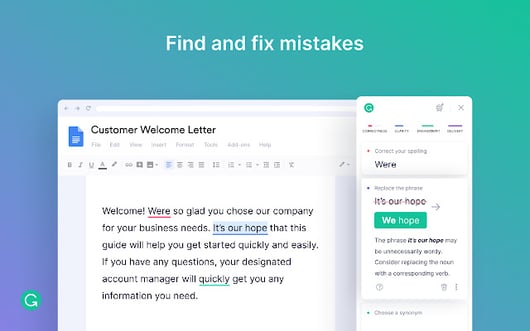
For an individual user, Grammarly allows you to track your writing performance and get edit suggestions based on your level of writing experience. The software will also send you emails that show you areas where you are excelling and where you need to improve.
Recently, Grammarly also added a feature where it could recognize and sense the emotional tone of your emails. For example, if you’re writing an email with “Thank you” in it, Grammarly will note that your message sounds “appreciative,” or “optimistic.”
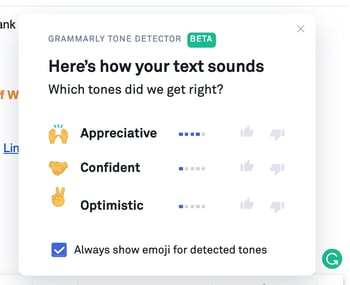
Pro Tip
Grammarly is also available for teams. With the team version, you can unlock customizable editing features that allow the software to make suggestions with your company’s writing styles and branded words in mind.
To learn more about Grammarly and other productivity tools, check out this blog post.
2. Frase.io
Price: Trial available; Plans start at $24.99 per month.
Frase.io is an AI-powered research assistant and question answering bot that uses and analyzes search data on your site. The software can also help you optimize articles and other content for SEO by reading the text, comparing it with similar online content, and offering search and keyword-based suggestions.
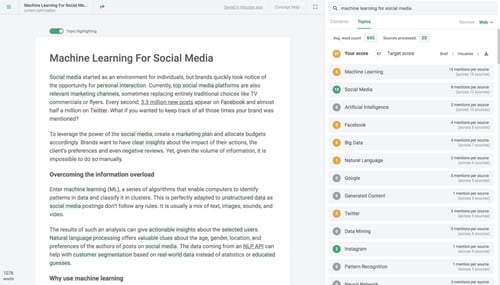
Aside from the SEO features, Frase.io also provides a bot feature. When a visitor is searching your site and would like to find something, they can simply type a question into the message box on your web page and receive an answer from a bot.
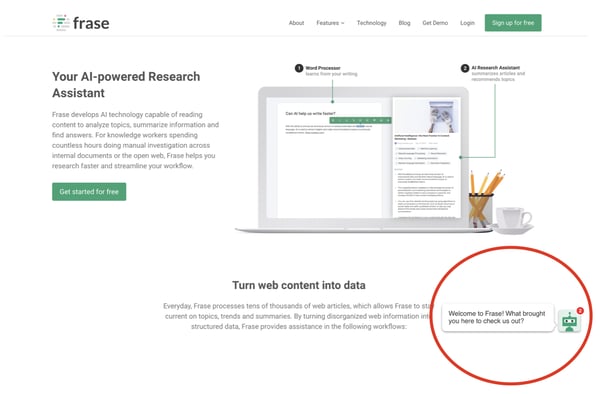
The bot uses machine learning to recognize the phrases given and match the words with content or pages related to those words. For example, if someone says, “I’m looking for a blog post on Instagram Stories,” the bot would reply with a link to one or more blog posts about Instagram Stories.
One company that benefited from this product was Embryo Digital, a small UK-based agency that used Frase.io to conservatively save 180 hours per month on research.
Pro Tip
Battling writer’s block? Frase.io can help with that. It offers a number of tools that create content automatically — such as its Blog Introduction Tool, which automatically generates a 100-word introduction for your blog title.
3. Google Analytics
Price: Free
By now, you’ve probably heard of or already use Google Analytics.
The leading analytics platform’s machine learning capabilities will answer questions about your website data.
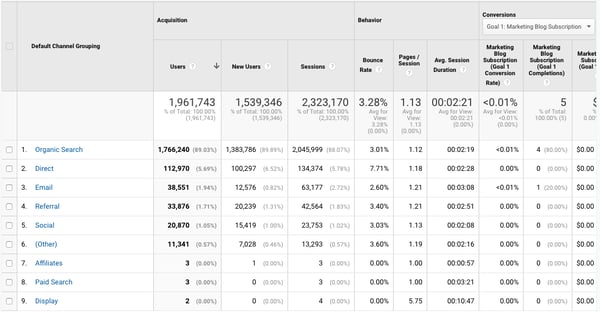
Although Google Analytics is the leading analytics tool of marketers and already has many AI tools that work upon launching it, it will take marketers time to set up their GA dashboards so that data is understandable and organized for full teams.
To learn more about this platform and how to get started on it, check out this ultimate guide.
Pro Tip
On top of giving you detailed insights on how your website is doing, GA also integrates with all of Google’s marketing products — including Google Ads, Search Console, and Data Studio.
4. Ahrefs
Price: $99-$999/month depending on your number of users and features.
Ahrefs uses data from Google and other search engines to show you where your web pages rank for certain keywords. It also allows you to query words or phrases to see how common people are looking them up on search engines.
This type of tool can quickly help you identify topics that you might want to blog about or see if your blog post or website is actually showing up on Google searches when people make queries related to your industry.
To give you more of an idea of how the software works, here’s a demo that walks you through how to do keyword research with Ahrefs:
If you’d like to better your keyword research strategies, but can’t afford something as intuitive as Ahrefs, you can also check out these tools which similarly leverage AI algorithms to help marketers identify search opportunities.
Pro Tip
Use Ahrefs’ Content Explorer tool to uncover content that generates a lot of social shares. And, if a specific social media platform is important to you — such as Twitter, for example — you can filter shares on that specific site. In addition, you can analyze any page’s social shares over time.
5. HubSpot
Price: Free CRM; Plans start at $50 per month and vary based on team size and tier subscribed to.
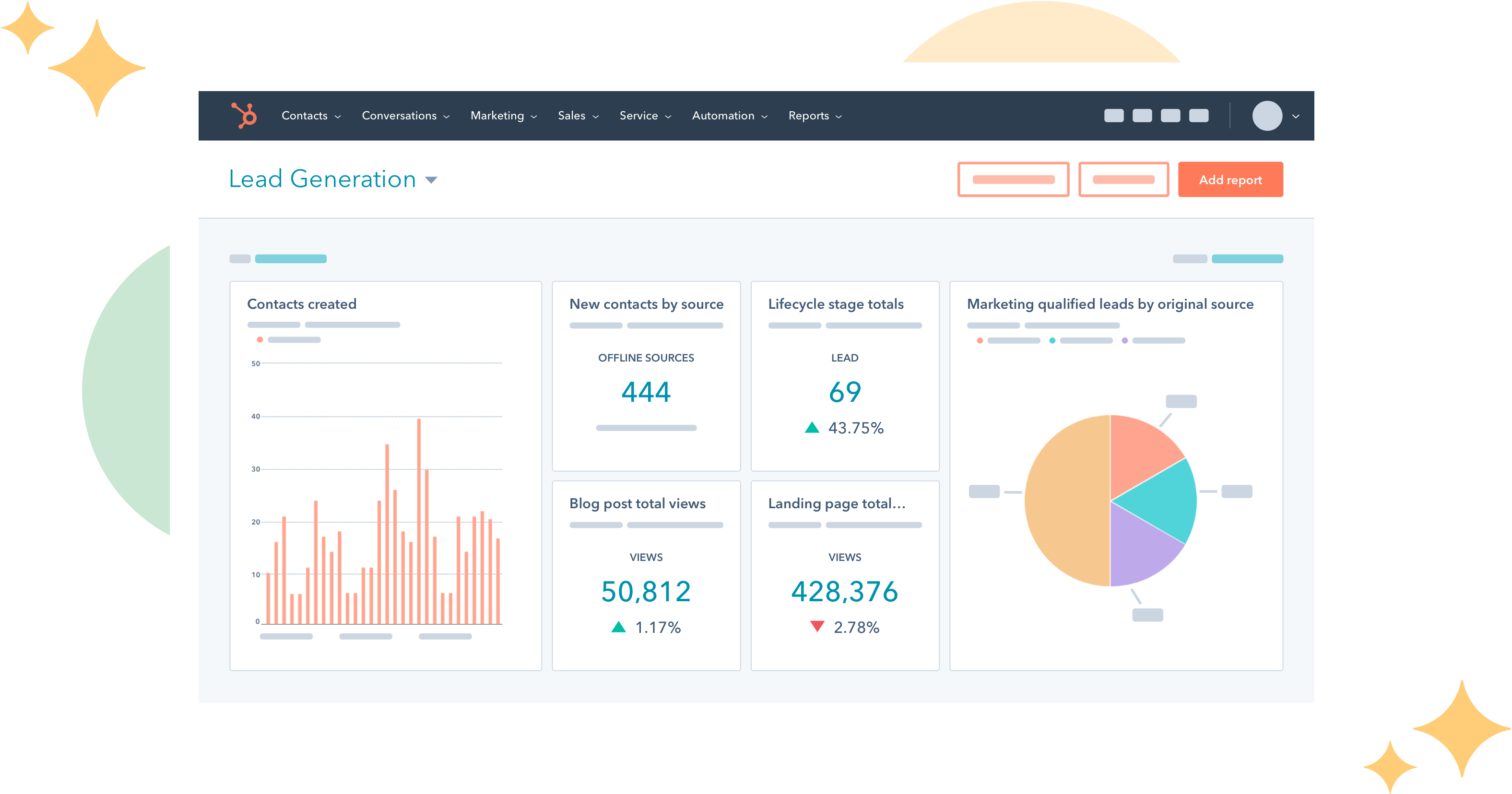
HubSpot incorporates AI in a number of ways. Here are just a few:
- SEO: HubSpot’s COS and CMS use algorithms to scour your posts for search optimization suggestions before you post.
- Emails and Workflows: When a customer does something such as engage with an email or landing page, this will trigger a canned email to be sent to them with their name and other personalizations in it.
- Social Media: HubSpot’s social media platform allows you to autogenerate post caption copy using machine learning. This technology recognizes sentences that you might regularly tweet or meta descriptions in a link you’re sharing, then crafts a caption that you can then edit or tweak.
- Deduplication features: If you upload a new list into a HubSpot CRM, or a pre-existing contact subscribes to your marketing newsletter, HubSpot will search the CRM to find matching contacts and prevent any duplicates from being added.
Pro Tip
For maximum engagement, schedule your emails at the most optimal time for your audience. For instance, if your email open rate plummets on the weekends, schedule them for a weekday.
6. Buffer
Price: Plans start at $6/month per channel and vary depending on your team size and number of channels.
If you’re a social media marketer, AI tools can take your work to the next level in a fraction of the time.
Buffer is a social media management software offering a range of tools to publish, track, and measure your social media content. For instance, you can maximize engagement by scheduling posts at the most optimal time of day, when your audience is most active.
Pro Tip
For many social media marketers, creating a steady stream of amazing content is challenging. With Buffer’s Calendar tool, you can schedule content months ahead, identify any content gaps, and hone in on certain holidays.
7. Mailchimp
Price: $11-$299/month, depending on how many contacts you have.
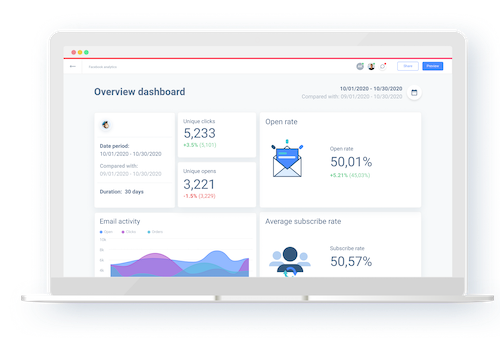
Mailchimp is a popular email marketing software that lets you create campaigns and build automated workflows. Depending on your plan, you can also access advanced audience insights and a library of email templates.
Pro Tip
Using Mailchimp’s Customer Journey Builder, you can automate marketing workflows for your contacts. From simple to highly complex, these journey maps can contain multiple starting points, branches, and unique actions — guaranteeing each of your contacts has a personalized experience.
Familiarizing Yourself With AI
Artificial intelligence can sound like an intimidating or expensive technology. But, the truth is, it’s getting more and more prominent in our world and workplaces today.
Ultimately, the best strategy for vetting AI products, tools, and opportunities that may come your way in the future is to research credible sources and ask the right questions about the software you’re considering.
If you’re looking to take the next step with technology implementation, check out HubSpot Academy’s latest course, “Artificial Intelligence and Machine Learning in Marketing.” The course gives an introduction to AI and machine learning while also walking you through how to implement it in your company’s marketing department.
Still in the initial research phase, but want to learn how AI could impact marketing in the next year? Discover four predictions from marketing AI experts in this blog post.







![Sign up for HubSpot Academy's ML & AI Lesson [Free Online Course]](https://no-cache.hubspot.com/cta/default/53/92d8c234-8980-4b3a-ab83-f9638e1399a4.png)


More Stories
New Career Opportunities in the Pet Sector
Offshore Drilling Jobs – How To Get Hired Without having Drilling Experience
Girls – How To Shatter The Glass Ceiling